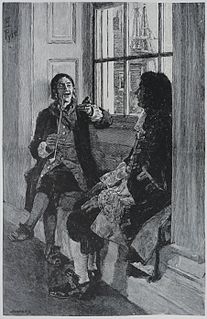Related Research Articles

William Kidd, also known as Captain William Kidd or simply Captain Kidd, was a Scottish sea captain who was commissioned as a privateer and had experience as a pirate. He was tried and executed in London in 1701 for murder and piracy.

A privateer is a private person or ship that engages in maritime warfare under a commission of war. Since robbery under arms was a common aspect of seaborne trade, until the early 19th century all merchant ships carried arms. A sovereign or delegated authority issued commissions, also referred to as a letter of marque, during wartime. The commission empowered the holder to carry on all forms of hostility permissible at sea by the usages of war. This included attacking foreign vessels and taking them as prizes, and taking prize crews as prisoners for exchange. Captured ships were subject to condemnation and sale under prize law, with the proceeds divided by percentage between the privateer's sponsors, shipowners, captains and crew. A percentage share usually went to the issuer of the commission.

Thomas Tew, also known as the Rhode Island Pirate, was a 17th-century English privateer-turned-pirate. He embarked on two major pirate voyages and met a bloody death on the second, and he pioneered the route which became known as the Pirate Round. Many other infamous pirates followed in his path, including Henry Every and William Kidd.
This timeline of the history of piracy in the 1680s is a chronological list of key events involving pirates between 1680 and 1689.
Thomas Wake was a pirate from Newport. Active during the Golden Age of Piracy, he is best known for sailing alongside Thomas Tew to join Henry Every in the Indian Ocean, hunting the Moghul treasure fleet.
John Hoar was a pirate and privateer active in the late 1690s in the Red Sea area.
Samuel Liddell was a pirate, privateer, and merchant active in the Caribbean. He is best known for sailing alongside Henry Jennings.
John James was a Welsh pirate active near Madagascar, Nassau, and the American east coast.
William Mayes was a pirate active in the Indian Ocean. He was best known for taking over William Kidd’s ship Blessed William and sailing with Henry Avery.
Josiah Raynor (1665–1743) was a pirate active in the Red Sea. Before he was briefly a pirate captain, he was a sailor on the Batchelor’s Delight on which he sailed alongside William Dampier.
George Dew, George Hout or George d'Hout (1666–1703) was a pirate, privateer, and buccaneer. He once sailed alongside William Kidd and Thomas Tew, and his career took him from Newfoundland to the Caribbean and the coast of Africa.
Christopher Goffe was a pirate and privateer active in the Red Sea and the Caribbean. He was eventually trusted to hunt down his former comrades.
Thomas Henley was a pirate and privateer active in the Red Sea and the Caribbean.
Thomas Woolerly was a pirate and privateer active in the Caribbean and the Indian Ocean.
George Bond was an English pirate active in the Caribbean. He was known for acting in league with the pirate-friendly Governor of St. Thomas, Adolph Esmit.
Thomas Day was a pirate and privateer active off the American east coast. He is known for being one cause of increasing tensions between the Governors of Maryland and Pennsylvania.
Peter Lawrence was a Dutch pirate and privateer active off New England and Newfoundland, and in the Caribbean. His and other pirates’ dealings with Rhode Island’s governors nearly led to the colony losing its charter.

Étienne de Montauban was a French flibustier (buccaneer), privateer, and pirate active in the Caribbean and off the west African coast. Frequently referred to as Sieur de Montauban, he wrote an account of his later voyages including surviving a shipwreck.
Thomas Penniston was a privateer who operated out of New England. He was known for sailing alongside Adrian Claver and Regnier Tongrelow.
William Coward was a minor pirate active off the coast of Massachusetts. He is known for a single incident involving the seizure of one small vessel, largely thanks to events surrounding his trial.
References
- ↑ Marley, David (2012). Daily Life of Pirates. Santa Barbara CA: ABC-CLIO. p. 136. ISBN 9780313395635 . Retrieved 17 August 2017.
- 1 2 3 4 Dow, George Francis; Edmonds, John Henry (1923). The Pirates of the New England Coast, 1630-1730. New York: Courier Corporation. pp. 31–32. ISBN 9780486290645 . Retrieved 17 August 2017.
- ↑ "Dew, George, - 1695 | Yale Indian Papers Project". yipp.yale.edu. Retrieved 17 August 2017.
